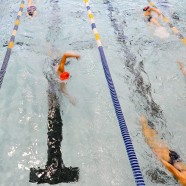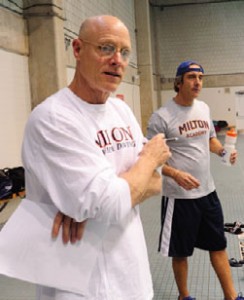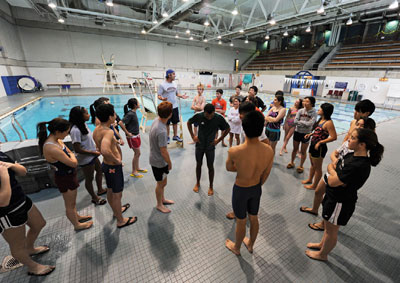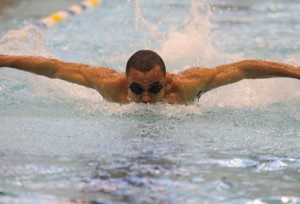
In New England, swimming is a winter-season sport. Swimmers come in from the cold, peel off the layers, pull on their suits (still wet from the day before, in some cases), slip into their lanes and push their bodies to exhausting limits. Their motivation comes from their love of the sport, and at Milton it also comes from a supportive and fun team culture that the coaches work hard to foster.
Twenty-four years ago, with David Foster (English faculty and, earlier, college counselor), Coach Bob Tyler brought the coed Milton swim team from club status to an interscholastic, competitive team. Today, Bob coaches with Jamie LaRochelle, or Coach “La,” as the swimmers call him. Both are science faculty members whose friendship goes back to their swimming days at Deerfield Academy.
“Our coaching styles complement one another. Neither one of us feels the need to be more in charge,” says Coach Tyler.
As the practice starts, all the swimmers are “on the wall chatting.” The swimmers self-select their lanes, and the stronger swimmers tend to group together. The coaches accommodate the range of swimmers (from well-tested competitors through less experienced swimmers) by focusing on sets of timed swims: for example, four four-minute swims. All the swimmers begin together. Distances vary; swimmers in the fast lane might do a 300 and a swimmer in a slower lane might do a 200. Every student is focused on his own swim. The swimmers seem to appreciate the coaches’ approach.
“In practice, you decide how hard you want to work, and then you see your work pay off in your results,” says Kasia Ifill (II). “The coaches do push us, and it’s amazing what they do to help us improve in three months.”
 The coaches are especially interested in stroke technique. Coach Tyler periodically uses an underwater camera to capture every swimmer so he or she can see strokes precisely.
The coaches are especially interested in stroke technique. Coach Tyler periodically uses an underwater camera to capture every swimmer so he or she can see strokes precisely.
On the day before winter break, the mood on the bus going to practice is festive. A few students are belting out Taylor Swift songs as the swimmers get settled into their seats. This is going to be a “fun” practice according to Coach Tyler. The swimmers are going to work hard, but he will mix up the regular routine with games.
Pool time for Milton swimmers is more limited than both coaches would like, due to travel time to get to the UMass Boston pool and sharing the pool with other schools. “We do a lot of stroke instruction and drills; if we had more time in the pool, swimmers could repeat the stroke change enough times for it to really sink in,” says Coach LaRochelle.
“The upside is that we don’t develop a myopic team culture,” he says. “We are swimmers who are violinists. We are swimmers who are poets and scientists. That’s a good thing in the big picture, even though the limited pool time can be frustrating.”
Many Milton swimmers are very experienced and successful, and a number have competed on year-round club teams since their single-digit years. Some juggle both the Milton team and their club team during the season. The sport demands commitment, but all of the swimmers know what their priority must be.
“School has to be first. You have to use your time efficiently. It’s not always easy, but I love swimming, so it’s worth it,” says Eric Zhang (III).
The team competes against nine to eleven schools in a season, in dual meets or in three-team contests. The meet against Deerfield requires the furthest distance away for a regular meet. On one bitterly cold Saturday in January, the team heads to the UMass pool for a home meet against Worcester Academy. Their previous meet against Exeter, a longtime swimming powerhouse with post grad swimmers on the team, was a tough one. The coaches, however, are focused on the swimmers. “They’re swimming well,” says Coach LaRochelle.
A swim meet is a coordinated, collective effort that relies on the swimmers, coaches, officials and volunteers. Coach Tyler arrives early to set up Milton’s timing and sound system. The empty pool quickly fills up. Eighty swimmers and coaches fill the pool deck; spectators take seats above, in the stands. The room is wet and noisy as swimmers get in the pool to warm up.
 The meet includes 22 individual and relay races, alternating between girls’ and boys’ competitions. When one race finishes, the next one begins within a minute or two. Until they arrive at the pool and see the lineup list, the swimmers don’t know which races they are swimming. Some groans emanate from swimmers who aren’t too happy with their lot. A few pleas to the coaches to make a switch are quickly rebuffed. This is a team effort, and everyone must do a part.
The meet includes 22 individual and relay races, alternating between girls’ and boys’ competitions. When one race finishes, the next one begins within a minute or two. Until they arrive at the pool and see the lineup list, the swimmers don’t know which races they are swimming. Some groans emanate from swimmers who aren’t too happy with their lot. A few pleas to the coaches to make a switch are quickly rebuffed. This is a team effort, and everyone must do a part.
Team captains Vincent Kennedy (I) and Erin Yang (I) will swim the 500 (20 laps)— the longest race. Both seemed unfazed by the assignment, though neither usually swims this race. Erin will win her 500, as well as the 50 Freestyle and 200 Freestyle Relay, where she swims the last leg. Her talents shine in this meet. Vincent places second in the 500 and is surprised by how much he enjoyed the pace of a long race.
In each race, swimmers compete both for the team and for themselves. Can they improve their time and beat their splits? Will they place in the top three and earn points for the team? Will they hold up their end in the relay? Not every swimmer is going to earn points today, but the effort and meeting personal goals count and are noticed.
Every swimmer has the support of her teammates, who take positions on either side of the pool for each race to cheer, leaning over the sides to yell encouragement. Sometimes the loudest cheers are for the last swimmers, pushing themselves to the finish.
“The best part of our team is that we really support each other during the races. Someone is always cheering for each swimmer,” says Eric.
The coaches multitask: tracking each swimmer’s split with a stopwatch, and keeping track while also keeping an eye on the race.
“When they time my splits, I can see if I’m going out too fast or slow. It helps me better pace myself in the next race,” says Genevieve Iwanicki (II).
Each coach has a unique cheer. Coach Tyler, who once dyed his hair pink to celebrate a girls’ relay team breaking a record, uses a loud, staccato “Come on! Come on!” Coach LaRochelle purses his lips into a piercing whistle that rings out across the pool. The swimmers say they can hear it during certain races, depending on the race and stroke.
 As racers finish, they run over to the
coaches to hear their splits and feedback. “You’re a rock star!” “It’s all right. No worries.” There are high-fives and good-natured joking as well as brief one-on-one talks about strokes and form.
As racers finish, they run over to the
coaches to hear their splits and feedback. “You’re a rock star!” “It’s all right. No worries.” There are high-fives and good-natured joking as well as brief one-on-one talks about strokes and form.
“The coaches are my favorite part of the team,” says Erin. “They understand that I have trained a lot more yardage than you normally do in high school swimming, but they got me over the idea that hard yardage was the only way to get faster. I’m a lot smarter in my races, which is why I’m dropping time.”
Midway through the races, after the 50 Freestyle, the teams break for the diving competition. Milton’s two diving coaches are Interfaith Chaplain Suzanne DeBuhr and Kristi Jacobi, an assistant director of admission. They work closely with Milton’s four divers during practice, critiquing and encouraging. Even when an opposing team does not field any divers, the Milton divers still compete and earn the points. Milton swimmers line one wall to cheer for their teammates. In a show of sportsmanship, the Worcester swimmers gather on the other side and lend their support. In this moment, the individual on the one-meter board and his or her impressive twists and turns into the water is everyone’s focus.
In a regular meet, divers need a repertoire of six dives. Ian Kennedy (IV), brother of Vincent, is new to diving and has only three, so Ian dives as exhibition and his points don’t count. You wouldn’t know that from the cheers. The other three divers are Matt Rohrer (II), Josh Ellis (II) and Tiffany Nguyen (I). The two judges sit in chairs, their faces grim and hard to read, but their scores make the divers and crowd happy. In the end, Tiffany earns her highest score of the season at this meet. Matt earns second place for boys, while Josh places first and receives his highest score of the season. Unlike the other divers, Josh competes in the races despite using the practices for diving only. A natural in the water, today he places first in the 50 Freestyle and the 200 Freestyle Relay, and second in the 200 Medley relay. Josh swims the last leg in both relays.
When diving concludes, it’s back to the races. Rex Li (III) has a strong day with two second-place finishes in individual races, and first- and second-place finishes in relays. Brian Trippe (I) and Eric also finish strong in their races. For the girls, Kasia Ifill (II) places first in the 100 Butterfly and second in the 200 Individual Medley. Maura Gately (III), Laura Barkowski (IV), Faith Pang (IV) and Zoe Kurtz (II) also have strong races. Credit goes to Steven Char (IV), sick all week, who still gets in the pool and swims both the 200 Freestyle and the 500, where he misses third place by a hair. Sophie Kaufman (IV) is swimming with a recovering shoulder injury, but she still places third in the 100 Backstroke. All of the swimmers, regardless of finish, have given their best effort.
In the end, the meet goes to Milton 177–161. The girls win 103–73 and the boys, who are missing a couple of swimmers today, lose 74–88. “Gang, a fabulous meet today! Great energy and great job!” says Coach Tyler as the swimmers crowd around when the meet finishes. After a cheer of support for Worcester, the tired swimmers head off to the locker room to change while the coaches start breaking down the timing system, to store away for the next meet.
“The first goal, year after year, is to make sure the swimmers have a great team experience,” says Coach LaRochelle. “That’s true regardless of how fast you swim, how high you can dive, or whether your stroke is technically correct. The swimmers on the team love the swim team. Our focus is on personal effort and improvement, teamwork, and sportsmanship.”
— Liz Matson



